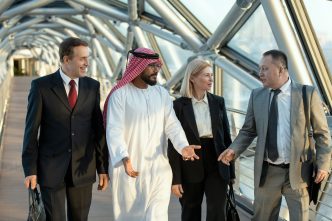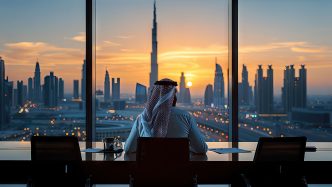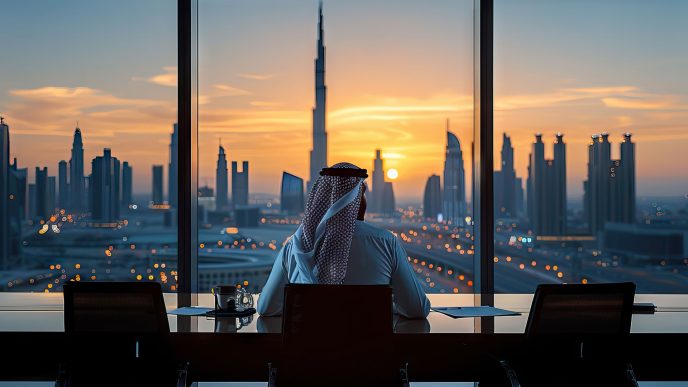Dubai, a city synonymous with innovation and ambition, is a beacon for international entrepreneurs. Its strategic location and business-friendly environment make it a global hub for commerce and innovation.
As we approach 2025, Dubai is poised to redefine its business landscape. The city’s vision is not just about economic growth, but also about creating a sustainable and inclusive future.
This article explores the emerging business trends in Dubai as we approach 2025. It provides insights into the city’s unique market dynamics and regulatory procedures. It also highlights potential opportunities for business setup in Dubai and the UAE.
Whether you’re an international entrepreneur, a business consultant, or a startup founder, this article is for you. It aims to provide a comprehensive understanding of Dubai’s business environment.
The information presented here will serve as a strategic resource for planning and decision-making. It will help you navigate the complexities of setting up a business in Dubai.
So, let’s delve into the future of Dubai’s business landscape. Let’s explore the trends that will shape the city’s economy and the opportunities they present for businesses.
Welcome to Dubai 2025 – a city of innovation, opportunity, and sustainable growth.
Dubai as a Global Business Hub: Strategic Location and Vision 2025
Dubai stands at the crossroads of east and west, an enviable position that enhances its stature as a global business hub. Its proximity to major markets in Asia, Africa, and Europe creates unmatched opportunities for trade and investment. This strategic location has been key to Dubai’s role as a gateway to some of the world’s fastest-growing economies.
The government’s Vision 2025 focuses on transforming Dubai into the world’s most sustainable and competitive city. This involves enhancing infrastructure, fostering innovation, and improving quality of life. Such ambitious plans aim to attract international talent and businesses, reinforcing Dubai’s position as a business leader.
Dubai’s robust infrastructure and advanced logistics network offer another competitive edge. The city boasts world-class airports and shipping ports that facilitate efficient global trade. Coupled with forward-thinking government policies, Dubai continues to build a future-ready economy that promises long-term growth and prosperity.
Understanding Dubai’s Unique Business Culture
In Dubai, the fusion of modernity and tradition shapes its unique business culture. Networking and personal relationships are paramount to business success. Entrepreneurs often find it beneficial to engage with local partners who understand cultural nuances.
Dubai’s business environment is fast-paced and highly competitive. Decision-makers value promptness and efficiency in their interactions. This focus on results is balanced by an appreciation for hospitality, which often extends to business meetings and negotiations. Building a rapport with stakeholders can be crucial for securing long-term partnerships.
Respect for cultural customs and practices cannot be overstated. From dress codes to business etiquette, understanding these aspects fosters trust and credibility. Furthermore, Dubai’s cosmopolitan nature allows for a diverse business environment, welcoming people from all over the world. This diversity enriches the city’s business fabric, offering a breadth of perspectives and insights beneficial to innovative solutions and growth.
Economic Diversification and the Impact of Expo 2020
Dubai’s drive for economic diversification is reshaping its growth trajectory. The city aims to reduce reliance on oil revenues by expanding into sectors like tourism, finance, and technology. This shift supports long-term economic sustainability and resilience against global market fluctuations.
Expo 2020 catalyzed significant change, highlighting Dubai on the global stage. The event brought increased foreign investment and spurred infrastructure developments. As a result, businesses across various industries experienced heightened demand and opportunities, strengthening the local economy’s foundation.
The legacy of Expo 2020 goes beyond temporary boosts. It set a precedent for innovation and collaboration in Dubai. The event facilitated connections among global businesses, leading to new ventures and partnerships. This enduring impact positions Dubai as a hub for future world-class events, driving further economic diversification.
Smart City Initiatives and Tech Start-up Ecosystem
Dubai’s vision to become a leading smart city is rapidly advancing. Investment in cutting-edge infrastructure and technology underpins this transformation. Key initiatives focus on enhancing efficiency, connectivity, and sustainability across all sectors.
Tech start-ups are thriving within this ecosystem. Dubai offers a fertile ground for innovation with ample resources and support. Entrepreneurs benefit from access to state-of-the-art facilities and a vibrant network of industry leaders.
The city’s commitment to digital transformation is evident in several areas:
- Smart transportation systems
- Advanced telecommunications infrastructure
- Efficient energy management solutions
Collaboration between the public and private sectors fuels this tech-driven growth. Government initiatives incentivize start-up development, providing funding and mentorship. This creates an environment where creativity meets opportunity, fostering a culture of innovation.
Government Support for Entrepreneurship and Innovation
The government of Dubai plays a crucial role in fostering innovation and supporting entrepreneurs. Various initiatives aim to create a favorable environment for start-ups. This proactive approach drives economic growth and diversification.
Financial incentives are a significant aspect of this support. Programs offer grants, subsidies, and tax breaks to budding businesses. These initiatives ease the financial burden and boost entrepreneurial success.
Moreover, entrepreneurial hubs and incubators provide vital resources. These centers offer mentorship, networking opportunities, and workspace solutions. Such support structures are critical for start-ups to thrive in competitive markets.
The Dubai 2040 Urban Master Plan and Business Opportunities
The Dubai 2040 Urban Master Plan is a transformative blueprint for the city’s future. It focuses on sustainable development and improving quality of life. This visionary framework opens vast business opportunities across various sectors.
A key aspect of the plan is urban expansion. It prioritizes the development of new residential, commercial, and recreational areas. These expansions create potential for real estate and related industries to flourish.
Additionally, infrastructure development under the plan is significant. Investments in transportation and public amenities are poised to enhance connectivity. This growth not only improves living standards but also attracts businesses, fueling economic diversity.
Sustainability and Green Technologies: The Future of Dubai’s Economy
Dubai is steadily positioning itself as a leader in sustainability. The city embraces green technologies as pivotal to its economic evolution. Initiatives focus on reducing carbon footprints and adopting renewable energy.
Investment in solar energy is substantial. The Sheikh Mohammed bin Rashid Al Maktoum Solar Park exemplifies this. As one of the largest solar power projects worldwide, it showcases Dubai’s commitment to renewable energy.
Moreover, green building standards are gaining traction. The implementation of sustainable construction practices is encouraged. This trend not only supports environmental goals but also attracts eco-conscious investors and businesses.
Economic incentives further boost green technology adoption. Companies investing in energy-efficient solutions benefit from reduced operational costs. This enhances profitability while contributing to the overall sustainability goals of the city.
E-commerce and Digital Transformation: Adapting to New Consumer Behaviors
Dubai’s e-commerce sector is seeing explosive growth. Digital transformation is revolutionizing shopping experiences. Consumer behaviors are shifting toward online and mobile platforms.
Traditional retail models are evolving rapidly. Businesses must adapt to meet the needs of tech-savvy consumers. Investing in digital marketing strategies is crucial for competitiveness.
Secure online payment systems enhance consumer trust. This is essential for capturing and retaining digital consumers. Technology integration in logistics also ensures swift and reliable delivery services.
Fintech Evolution and Regulatory Frameworks
The fintech sector in Dubai is booming, driven by innovation. This growth is supported by modern financial regulations, fostering a dynamic environment for entrepreneurs. Such progress signals a shift toward a digital-first economy.
Regulatory bodies are playing a key role in this evolution. New frameworks are being implemented to support fintech development. These frameworks offer clear guidelines while encouraging innovation.
Dubai’s competitive edge is strengthened by these regulatory advancements. Flexible regulations are crucial for fintech start-ups to thrive. This adaptability is helping position Dubai as a global leader in fintech innovation.
Artificial Intelligence and Blockchain: Reshaping Industries
Artificial intelligence is changing Dubai’s business scene significantly. Companies are integrating AI to improve efficiency and make data-driven decisions. This technology is becoming crucial for staying competitive in various sectors.
Blockchain technology is also making waves across industries in Dubai. It’s providing secure and transparent solutions for transactions and data management. This technology fosters trust and reduces operational costs, benefitting businesses of all sizes.
Together, AI and blockchain are driving a new era of digital transformation. These technologies are enabling innovative applications and services. As more industries adopt them, Dubai’s economy is poised for substantial advancement and modernization.
Remote Work Trends and the Demand for Flexible Workspaces
The shift to remote work is a key trend in Dubai’s business landscape. Many companies are rethinking traditional office spaces. This change is driven by the need for flexibility and cost efficiency.
Employers and employees alike see the value in remote work setups. Flexible workspaces offer the adaptability businesses need. These spaces support collaboration and productivity without long-term commitments.
As demand grows, more coworking spaces and serviced offices emerge. Dubai is becoming a hub for such innovative work environments. These spaces cater to evolving workforce needs, fostering creativity and networking opportunities.
The Evolving Landscape of Tourism and Hospitality Post-Pandemic
The tourism and hospitality sector in Dubai is undergoing transformation. In response to the pandemic, businesses adapted to new health standards. This shift has reshaped the industry into a more resilient version of itself.
As the world reopens, Dubai has embraced advanced technology solutions. Contactless services and digital applications have taken center stage. These innovations ensure safety and enhance customer experiences, drawing visitors back.
With a focus on personalized and experience-driven services, Dubai is poised for growth. Tailored luxury experiences and sustainable tourism options are now priorities. These developments make Dubai an attractive destination for global tourists, positioning it as a leader in post-pandemic recovery.
Healthcare Innovation and Medical Tourism
Dubai’s healthcare sector is rapidly evolving, driven by innovation. The city has become a global leader in medical tourism. Visitors come from around the world seeking quality treatment options.
Advanced technologies like AI are revolutionizing healthcare in Dubai. These tools improve diagnostics and patient care. Such developments position Dubai as a hub for cutting-edge medical services.
Medical tourism in Dubai offers a blend of expertise and hospitality. Patients receive world-class care in state-of-the-art facilities. The city’s commitment to health excellence attracts international clients, strengthening its global reputation.
The Role of the DIFC and UAE’s Golden Visa in Attracting Global Talent
Dubai International Financial Centre (DIFC) is central to the city’s business allure. It provides a regulated environment for financial entities. With its robust legal framework, the DIFC attracts top-tier global firms.
The UAE’s Golden Visa program offers additional incentives. It allows skilled professionals and investors to live and work in the region. This long-term residency option is crucial for attracting international talent.
Both initiatives contribute to Dubai’s dynamic economy. They offer stability and opportunities for career growth. By fostering a welcoming environment, Dubai remains competitive on the global stage.
Free Zones and Foreign Business Ownership: Navigating the Challenges
Dubai’s free zones are vital for foreign business ownership. They offer a range of benefits to international entrepreneurs. These include full foreign ownership and tax exemptions.
Each free zone caters to specific industries. This specialization helps businesses find the right fit for their operations. However, selecting the most suitable free zone can be complex.
Understanding the legal requirements is crucial. Different zones have unique regulatory frameworks and processes. Entrepreneurs must research thoroughly to overcome potential challenges and maximize opportunities.
The Process of Business Setup in Dubai: Licenses and Approvals
Setting up a business in Dubai involves navigating a structured process. Obtaining the right licenses and approvals is essential. These documents legitimize operations within the UAE.
The first step is selecting the business activity. This choice determines the appropriate type of license needed. Common options include commercial, industrial, and professional licenses.
Entrepreneurs must also meet specific legal requirements. The process involves several phases, such as:
- Registering the business name and checking its availability.
- Submitting required documents to relevant authorities.
- Paying the necessary fees for license issuance.
After fulfilling these steps, businesses can commence operations. Each phase requires attention to detail and compliance with local laws. Ensuring all legalities are properly addressed sets the foundation for a successful business venture in Dubai.
Conclusion: Preparing for Success in Dubai’s Future Business Landscape
Navigating Dubai’s dynamic business environment requires strategic foresight. As 2025 approaches, understanding emerging trends is crucial. Entrepreneurs must stay informed about market shifts and regulatory updates.
Successful business establishment hinges on adaptability. Businesses must integrate innovative practices and align with sustainability goals. Engaging with Dubai’s tech-savvy ecosystem offers competitive advantages.
Planning for future success involves leveraging local support networks. Entrepreneurs should foster strong relationships and partnerships. These connections provide insights into cultural nuances and economic opportunities. By embracing these strategies, businesses can thrive in Dubai’s evolving landscape.
FAQs: Common Questions About Business Setup in Dubai
What are the main steps for setting up a business in Dubai?
The process begins with selecting a business activity and name. Then, you’ll apply for initial approval from relevant authorities. Final steps include acquiring licenses and operational permits.
Can foreigners fully own businesses in Dubai?
Yes, Dubai offers various free zones where 100% foreign ownership is possible. Mainland companies may require a local partner unless specific criteria are met.
What types of licenses are available for businesses?
Common license types include commercial, professional, and industrial. Each category requires specific documents and approvals based on the business activity.
Is a physical office mandatory for registration?
For most businesses, a physical office is required. Exceptions exist for virtual offices within designated free zones catering to specific industries.
How long does it take to set up a business?
Timeframes vary based on the business structure and industry. Typically, it takes two to six weeks for standard approvals and licensing.
What is the role of local sponsors or agents?
Local sponsors are required for certain mainland businesses and may hold a minority share. They facilitate government processes and offer market insights.
Are there any tax benefits for setting up in Dubai?
Dubai offers a tax-friendly environment with no corporate or income tax in many sectors. Value Added Tax (VAT) applies at a standard rate of 5%.
What is the significance of Dubai’s free zones?
Free zones offer benefits like full foreign ownership, repatriation of profits, and tax exemptions. Each zone specializes in specific industries to suit diverse business needs.
Do Dubai laws support intellectual property protection?
Yes, Dubai has robust IP laws ensuring the protection of trademarks, patents, and copyrights. Businesses must comply with registration and renewal procedures.
How can I ensure compliance with local regulations?
Engage legal and business consultants familiar with UAE laws. They provide guidance on regulatory compliance, licenses, and market practices, ensuring your business operates smoothly.



















